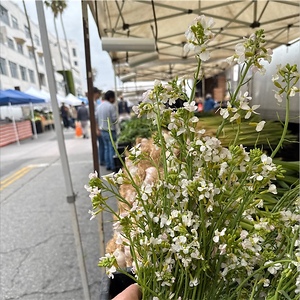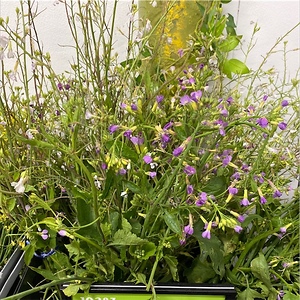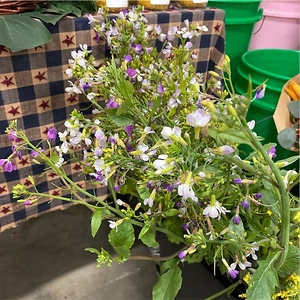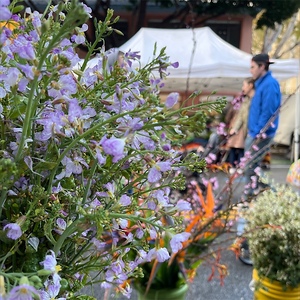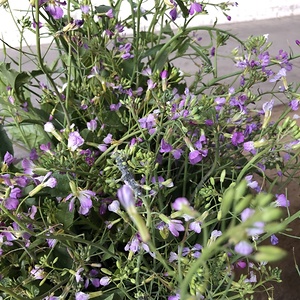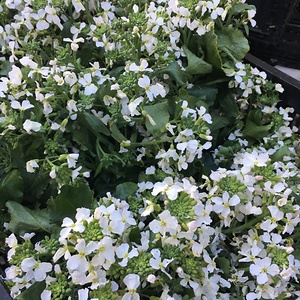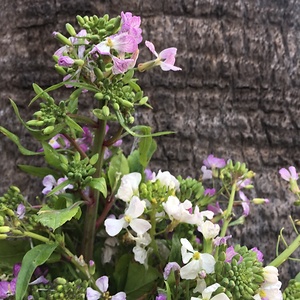


Radish Flowers
Estimated Inventory, 100 ct : 3.00
This item was last sold on : 08/02/25
| Fresh Origins | Homepage |
Description/Taste
Radish blossoms are small, measuring approximately 1 to 2 centimeters in diameter. The flowers grow at the end of hollow succulent stems, and each bloom is comprised of four ovate petals surrounding bright yellow stamens, forming the shape of a cross. The petals feature prominent webbed veining and are bright white at the center, blending lavender and deep purple hues at the edge. Radish blossoms are highly aromatic, with a delicate and refreshing texture and a subtly peppery flavor mixed with a slight sweetness.
Seasons/Availability
Radish flowers are available year-round.
Current Facts
Radish blossoms bloom from elongated stems of radish plants, a group of bush brassicas botanically classified as Raphanus sativus. Radish plants are traditionally grown for their roots which come in a variety of shapes, sizes, and colors, including white, red, burgundy, black, and green. The entire plant is edible, including the leaves, flowers, and seed pods. Radishes are divided into four categories named for the four seasons and based on their ideal growing conditions. Radishes are a quick-growing crop, with some varieties maturing in as little as three weeks. If the plants are left past their ideal maturing window, or if the weather warms unexpectedly, the plants will be triggered to grow long shoots that will blossom. If left longer, these pollinated flowers will develop into seed pods. Radish blossoms may be found year-round, but the blooms are often seen during the warmer months when plants are triggered to bolt. The flowers have become a popular culinary ingredient, adding flavor, color, and texture to a variety of recipes.
Nutritional Value
Radish blossoms are rich in vitamin C to support the body's immune system and the repair of bodily tissues. The flowers also contain high levels of iron, a mineral that is a major component of hemoglobin, phosphorus for DNA production, and folate to support cell growth. Edible flowers also contain moderate levels of antioxidants to help the body fight free radicals and oxidative stress that can damage cells.
Applications
Radish blossoms are suited for raw preparations as a finishing herb to add color, texture, and flavor. The flowers can be used whole, or the petals can be separated for a varied look. Spread the flowers over green salads or use them to top grain dishes like rice, farro, and couscous. The blossoms can be floated atop warm or chilled salads, folded into pasta dishes, or spread across poultry, pork, or lamb dishes. Incorporate the flowers into butter, Greek yogurt, or soft cheeses to make an attractive spread for bread and crackers. The flowers can be added to the dough of savory bread, such as focaccia, tortillas, and parathas, or they can top frittatas, quiche, and scallops. The delicate blooms can be pressed into cheeses, rolled into spring rolls, frozen in ice cubes for cocktails, or used on pizzas and flatbreads. Radish blossoms complement salad greens as well as hard and soft cheeses. The peppery flowers pair well with various fruits, including peaches, pears, and grapes, vinegar and lemon juice, and fresh leafy greens and vegetables like cucumber, tomatoes, and peppers. Radish blossoms should remain on the stems, stored in water inside the refrigerator, or left in a plastic clamshell or airtight container and used within 3 to 5 days for peak flavor.
Ethnic/Cultural Info
Throughout time, chefs have added edible flowers to their dishes to boost flavor and texture to evoke emotion through the symbolism associated with certain flowers. It was common practice to use edible flowers during meals in Victorian England. The flowers were enjoyed for their flavor and aesthetics and were often seen lavishly decorating desserts, flavoring cookies, cakes, and candies, and added to beverages. During this time, flowers were also used to decorate individual place settings, atop plates, and stuffed into folded napkins. Flowers played an important role in Victorian society. The types of flowers used held particular meaning, and edible flowers could not only add flavor and color but also tell a story during the meal. Although the Victorian language of flowers is no longer widely used, flowers still hold symbolic meaning in many cultures, and blossoms are used to tell stories in plating and cocktail making in the modern culinary world.
Geography/History
Radishes are believed to be native to China, where wild varieties can still be found. Radishes were spread to the Middle East during prehistoric times, and during this time, many different radish varieties were developed in the region before spreading further west to the Mediterranean. Radishes were cultivated in Ancient Egypt and were a food source for Egyptian workers while building the pyramids. Radishes were spread through Europe by the Roman empire, and by the Middle Ages, the roots were a popular vegetable for peasants. Radishes were one of the first vegetables brought to North and South America. The plant thrived in the temperate and arid climates in the region and became a common vegetable in Latin and indigenous cuisines. Radishes are now grown worldwide and are a staple ingredient in European, Asian, and Latin cuisines. Radish blossoms are not as common as the root vegetable, but the flowers can be found in farmers' markets and specialty shops during spring and summer.
Featured Restaurants
Restaurants currently purchasing this product as an ingredient for their menu.
| The Country Club Of Rancho Bernardo | San Diego CA | 858-487-1134 |
| Javier Plascencia (Animalon) | Bonita CA | 619-295-3172 |
| Juniper & Ivy | San Diego CA | 858-481-3666 |
| Kinme Omakase | San Diego CA | 619-231-0700 |
| Addison Del Mar | Del Mar CA | 858-350-7600 |
| Paradisaea Restaurant | La Jolla CA | 732-915-6669 |
| Le Coq | La Jolla CA | 858-427-1500 |
| Cove House | La Jolla CA | 858-999-0034 |
| Estancia Adobe | San Diego CA | 858-550-1000 |
| Rancho Santa Fe Golf Club | Rancho Santa Fe CA | 858-756-1582 |
| Sago | Encinitas CA | 858-382-4047 |
Recipe Ideas
Recipes that include Radish Flowers. One
| Fresh Local and Best |
|
Sherry's Radish Tops Pesto |




 Learn More...
Learn More...